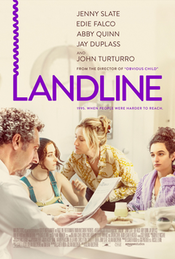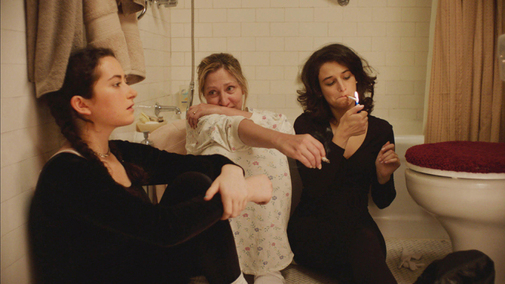By Spencer Coile
 During a pivotal scene in Gillian Robespierre's Landline, just out on DVD, a familiar song begins to play. Curious to figure out what it was, I quickly Shazamed it on my phone to discover that it was Angel Olsen's 2016 song "Sister." It is an epic song -- almost eight minutes long, discussing the longing nature of wanting to change. I was initially delighted to hear a song that resonated with me back when years ago. But why was a tune from the late 2010's playing in a film that takes place in 1995?
During a pivotal scene in Gillian Robespierre's Landline, just out on DVD, a familiar song begins to play. Curious to figure out what it was, I quickly Shazamed it on my phone to discover that it was Angel Olsen's 2016 song "Sister." It is an epic song -- almost eight minutes long, discussing the longing nature of wanting to change. I was initially delighted to hear a song that resonated with me back when years ago. But why was a tune from the late 2010's playing in a film that takes place in 1995?
Landline is a film that is all about time. It is rooted firmly in the mid-90's with plenty of political, social, and pop culture references (Jenny Slate's Dana remarks that her and her fiancé rented Curly Sue from Blockbuster and that "it's a good film"). The use of "Sister," however, speaks to the film's transcendence from a period piece to one that is equally as relevant in 2017...
The three generations of women in Landline are each in a rut. Mother, Pat (Edie Falco) seems caught in a marriage that is going nowhere. Her and her husband Alan (John Turturro) are antagonistic toward the other's parenting skills and clearly have lost their passion for one another. Similarly, their oldest daughter Dana (Slate) is engaged to a kind hearted man named Ben (Jay Duplass). Dana feels trapped by the possibility of marriage and begins to explore other avenues of self-expression. Finally, the youngest member of the family Ali (Abby Quinn) would sooner party and smoke pot with her boyfriend than to consider college applications. She is complacent with not going to school and with lying to her parents about everything.
These three storylines intersect when Ali suspects that Alan is having an affair. Agreeing to keep this secret from their mother, Dana and Ali attempt to find out if their suspicions are correct, and if so, who it is with.
The beauty of Robespierre's work is her empathy. We saw this in 2014 with her feature film Obvious Child, and we see it here again with Landline. These three characters are all stubborn, denying that they are making wrong decisions -- much to our frustration as observers. But there is something deeply felt pulsing through the entire film, something that feels eerily real. And without her coming out and revealing this explicitly, one could make the assumption that Landline is semi-autobiographical.
Pat, Dana, and Ali are each afraid of change in their own ways: Pat continually navigates her role as a wife and mother. After all, if Alan really is cheating, doesn't this mean that everything will change for her? Is it better not to know? We witness as Dana's belief in marriage begins to crumble. And Ali still does not know what or who she wants to be. There is something wholly universal about these inherent needs that each of us possess. There is something almost soothing about this film -- where we can watch these characters fumble through their relationships, taking comfort in the fact that, at least for the time being, they have it worse than we do.
Landline is timeless in the way it presents questions about identity. Oftentimes they are direct -- Dana tells Ali that she doesn't know what she wants to be, or maybe that she messed this up already. Who is she supposed to be? What is she supposed to do? Yet other times they are portrayed as trivial and humorous. In one opening scene, as the family jams to Steve Winwood's "Higher Love," Dana misinterprets the chorus as:
Break me a higher love...
And this moment is painfully amusing; not only does her entire family correct her, but this is an occurrence we have all experienced in one way or another. Who hasn't been convinced that lyrics to a song were something other than what they were? It is through these little moments that speak to the characters' complacency and inability to change.
Although taking place in the past, Landline is a film about the present and the future. The blending of current alternative music and 90's pop speaks to the timeless nature of the film. Sure, it keeps hitting the audience over the head that it takes place in 1995 (Pat watches Hillary Clinton's "women's rights are human rights" speech on the TV and is inspired by her fashion choice), but these are stylistic choices that help to sell the time period, while still winking to the audience that these are still issues that remain relevant today.
Of course, things do change throughout the course of the film. Pat, Dana, and Ali must reckon with the future and learn to embrace it. And this point is made stunningly clear through Angel Olsen's haunting ballad. In the climax, she croons:
All my life I thought I'd change
This line is repeated several times and becomes more intense and heartbreaking as the song progresses. And although its use in the film was initially jarring, in retrospect it feels perfect. The world keeps spinning and our lives keep changing -- and it is our responsibility to keep changing with it.
Grade: B+


